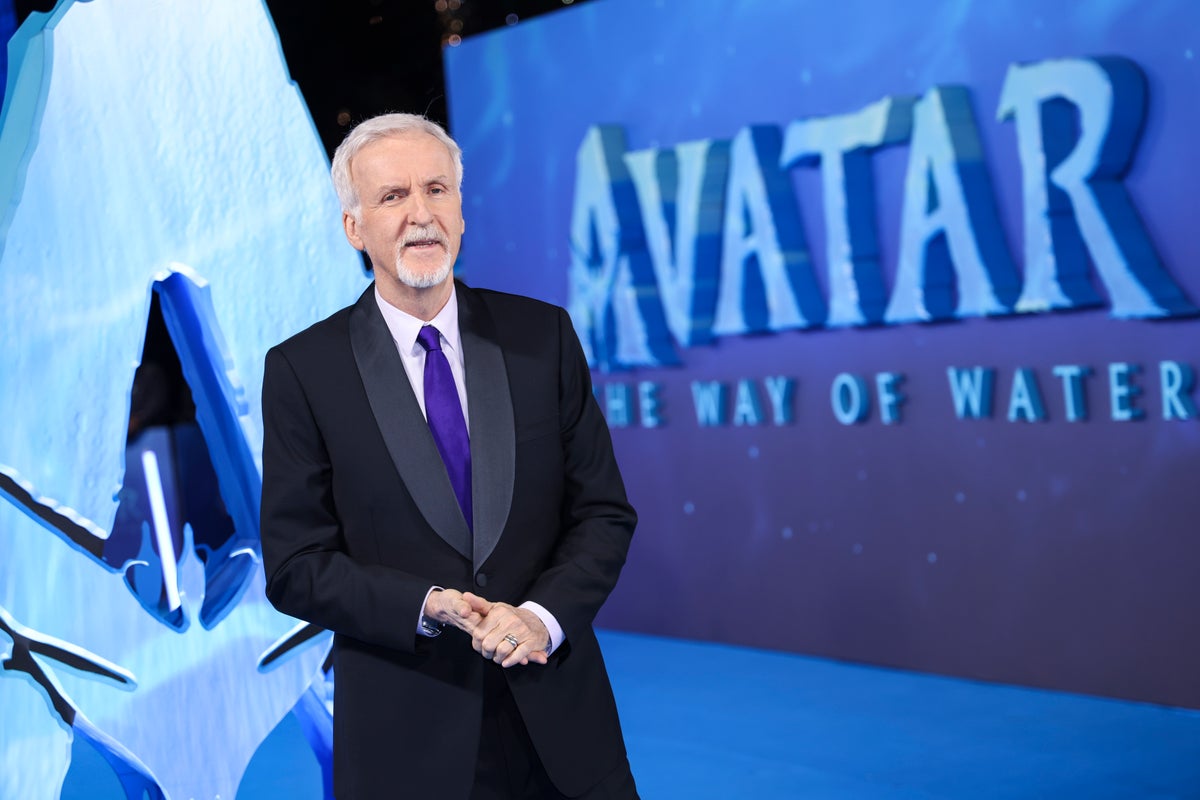
James Cameron has been living on Pandora for a long time.
But 13 years after the original “Avatar” and five years after starting production on its sequel, “The Way of Water,” Cameron is unveiling the long-awaited follow-up to the highest grossing film of all-time. Speaking the day after “The Way of Water” debuted in London, Cameron — back on Earth and self-admittedly out of practice with the hoopla of a red-carpet premiere — describes the experience of finally having the movie out in the world “surreal.”
“You work on these films kind of in a bubble. You create this world around you with your artists, with your casts and so on,” Cameron says. “Then one day you realize, ‘Oh crap, we’re going to have to show this to people at some point.’”
For a long time, the “Avatar” sequel was the “Waiting for Godot” of blockbusters – more theoretical than real, with release dates that kept spiraling into the future. Meanwhile, an unending parade of pieces pondered the original’s curious place in entertainment: a box-office behemoth with little cultural footprint, a $3 billion ghost.
But the first look at Cameron’s “Avatar” sequel has thrown some cold water on that notion. The overwhelming reaction to the director’s latest three-hour opus? Never bet against James Cameron.
“The important thing is that there are people willing to bet on me and on the ideas that interest me and I want to go forward with” Cameron says, speaking by video conference. “It was 20th Century Fox, Jim Gianopulos specifically, who OK’ed this film to go forward. Then we were acquired by Disney. That could have gone south but it didn’t. The word I got from them all the way along was: ‘We want quality. We want this movie. We want this movie for the theaters. We want to remind people what the theatrical experience is.’”
With a reported price tag of more than $350 million, a third “Avatar” film already wrapped and two more films planned after that, the Walt Disney Co. is placing a very big wager, indeed, on “The Way of Water.” But regardless of jokes about blue people or Papyrus font, Cameron’s latest — a deep-blue ocean epic of natural splendor, ecological protectionism and family perseverance — is poised to again blow audiences away, and possibly, once more rake in billions.
The film, which opens in theaters Thursday, might be Cameron’s most ambitious undertaking yet -- which is saying something for the 68-year-old filmmaker of “Titanic,” “The Terminator” and “Aliens.”
“I don’t want to do anything but big swings,” Cameron says. “I’m going to fall on my ass sooner or later. But if you’re not ready to fall on your ass, you’re not doing anything interesting.”
We've been here before. After cost overruns and delays, “Titanic” was written off as a sure-to-bomb case study of Hollywood excess. Then it made $2.2 billion in ticket sales and won 11 Oscars. Not everyone was pre-sold on “Avatar,” either, which resuscitated 3-D after decades of dormancy.
“‘Titanic’ was assumed to be a big steaming pile,” says Cameron. "That was a much bigger flip. And we had a similar flip on a smaller scale with the first ‘Avatar.’ People saw the trailer on a little window on their laptop and called it ‘Smurfs’ and ‘videogame cinematic’ and stuff like that. Then they went to see it in the movie theater and went, ‘Wait, wait. It’s pretty cool.’”
“There was a guarded skepticism around this film," he adds, “as there should always be with any new film.”
“The Way of Water,” which Cameron scripted with Rick Jaffa and Amanda Silver, takes place a decade after the events of the first “Avatar.” Jake Sully (Sam Worthington), the paralyzed Marine who donned an avatar on Pandora, is now fully enmeshed in the remote world of the Na’vi. He and Neytiri (Zoe Saldaña) have three teenage children. When human soldiers come hunting for him, Jake moves his family to a reef clan of Na’vi who live harmoniously with the ocean.
The trials the family endures turn surprisingly wrenching in what's already been called Cameron's most emotional film. That may be partly because much of Cameron’s own experience as a father raising five children in New Zealand is woven into the film, as is his early life growing up in Ontario as the eldest son of an electrical engineer father.
“I remember what that was like for me. I’ve been Lo-ak,” says Cameron, referring to Jake and Neytiri’s middle son. “I’ve been the kid whose father doesn’t get him or see him. I don’t mean to disparage my dad. He was a great dad of that period in the sense of putting a roof over our heads and out there working hard, breadwinner. But he didn’t know what to do with an artist kid. He didn’t know what to do with a flamboyant artist whose head was out in interstellar space all the time.”
“The Way of Water,” which is being shown in 3-D and 48-frames-per-second (double the standard), also means a new generation of technological advancement. While it's unlikely to be as much a milestone as the first was visually, the blend of CGI and live action, above ground and under water, makes for an even more strikingly detailed vistas.
“We’re able to deliver a much greater ability of photorealism than we ever did before,” says producer Jon Landau. “When we made the first movie, I would say to people, ‘We need it to be photographic.’ Now in this movie, we have so many Avatar, Na’vi characters in the live-action world and we have so many live-action characters in the Pandora world, we need to be photoreal. That’s a new standard we have to live up to.”
That's most beautifully rendered in the film's waters, where teeming science-fiction species of flora and fauna enrich an imagined ocean paradise. To Cameron, an avid deep-sea explorer whose passions for sea nearly outstrip his love of filmmaking, “The Way of the Water” is his grand ode to the ocean.
“It’s also a cri de coeur to people around the world to protect and be guardians of the oceans, to be guardians of nature, in general. That’s what these ‘Avatar’ movies are about,” Cameron says. "In New Zealand, the Maori people call it kaitiakitanga and it basically means guardianship of nature. I don’t think most people in so-called Western, industrial society really feel that strongly.
“Obviously, there are people of conscience, there are people who are activists for climate change and rain forest preservation and so on. But unfortunately, they’re not the majority in the seat of power. So I think it’s fair to say that we’ve got to change the way we do business or we’re not going to have these things," Cameron says. “The ocean of Pandora is probably very much like how the ocean of Earth used to be, at least in terms of profusion.”
“The Way of the Water” will arrive in theaters with expectations of a debut of at least $150 million on opening weekend in North America. More notably, it will quench the thirst of multiplexes that have, after some big summer successes, seen the number of wide releases — and moviegoers — slide this fall. When he debuted the first “Avatar," streaming was nascent; Netflix was just getting into the business of making movies. Now, for a much different movie landscape, Cameron will again hope to show audiences the full power of visionary grand-scale filmmaking.
“I’ve been thinking a lot lately about what art is in its essence. And I think dreams have something to do with it,” he says. “There’s like a render engine or a narrative engine that runs in our heads every night. It puts images and scenarios together in some kind of sequence. Sometimes, most times, they’re completely illogical. But they have a kind of momentary logic to them. I’m always telling everybody on the film, this is a movie with floating mountains. It doesn’t have to always be logical. It just has to have that dream logic.”
At the “Way of Water” premiere in London, Cameron was struck by how the audience looked different to him. It was a black-tie affair, unusual for him as a director, but that wasn't only it.
“I looked out at that audience and everybody looked so beautiful and they put so much energy into just showing up. It struck me that maybe we’re back,” Cameron says. “Maybe cinema’s back. Maybe enough people out there do care about that dream of cinema.”







